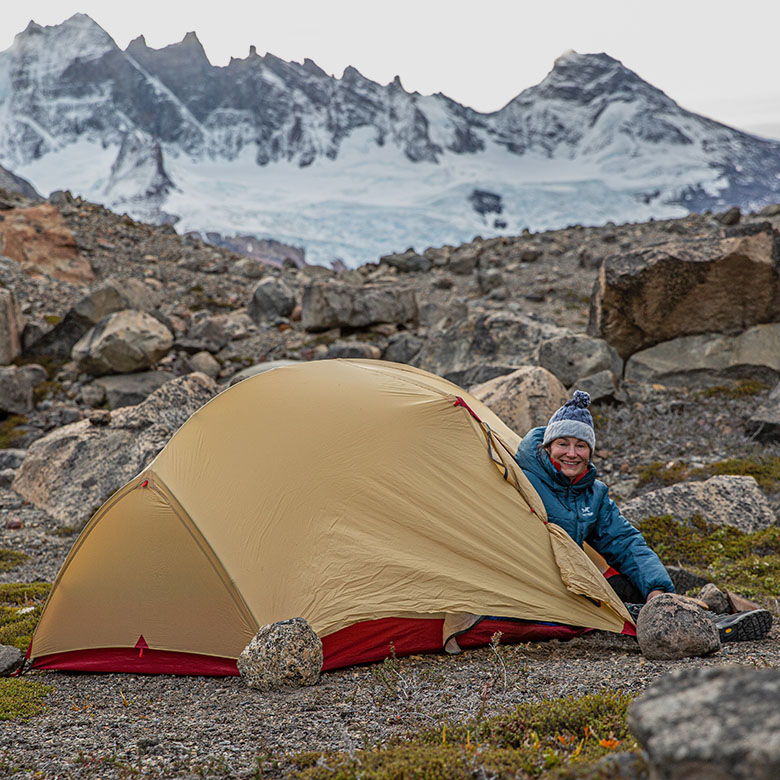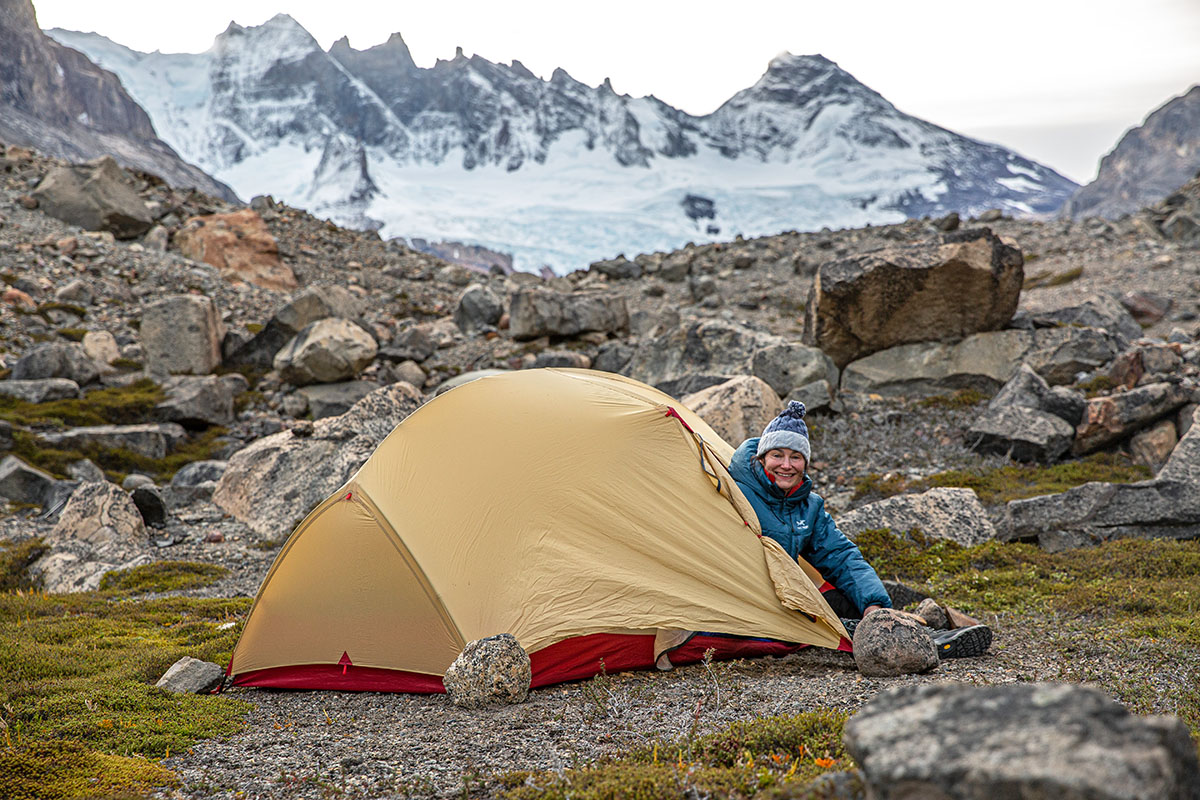Backpacking tent alternatives include hammock camping, bivy sacks, car camping, cabin rentals, and using a tarp alone or with a hammock. These options provide lightweight, versatile, and convenient alternatives to traditional tents.

Credit: www.switchbacktravel.com
1. Lightweight Alternatives For Backpacking
When it comes to backpacking, every ounce matters. Carrying a heavy tent can quickly become a burden on long hikes. Luckily, there are plenty of lightweight alternatives that provide shelter without weighing you down. In this section, we’ll explore some of the best lightweight alternatives for backpacking.
1.1 Hammock Camping
A hammock is a game-changer for backpackers looking to save weight without sacrificing comfort. Not only are hammocks lightweight, but they also provide a cosy and elevated sleep experience. Plus, they can be set up almost anywhere, as long as there are two sturdy anchor points.
With the addition of a tarp, hammock camping becomes even more versatile. It offers protection from rain, wind, and insects, ensuring a comfortable night’s sleep, no matter the conditions. Some hammocks even have built-in bug nets, further enhancing the camping experience.
1.2 Bivy Sacks
For minimalist campers, bivy sacks are a dream come true. These waterproof covers fit snugly around your sleeping bag, providing a lightweight and compact shelter. With a bivy sack, you can enjoy the simplicity of sleeping under the stars while still staying protected from the elements.
Bivy sacks are an excellent option for solo backpackers who prefer to travel light and fast. They are easy to set up, and their small size makes them ideal for squeezing into tight spots. When paired with a lightweight tarp or emergency blanket, a bivy sack can create a reliable and ultralight shelter system.
1.3 Car Camping
Car camping can be a convenient alternative to traditional backpacking tents if you can access a vehicle. With a spacious trunk or backseat, you can comfortably sleep in your car and have all your gear easily accessible. Car camping allows for more creature comforts, such as a larger sleeping pad, extra blankets, and even a portable stove.
Additionally, car camping opens up more possibilities for exploring remote areas. You can venture further into the wilderness without the constraints of carrying everything on your back. Just make sure to check local regulations and find designated camping areas to ensure a safe and responsible experience.
1.4 Cabin Rentals
If you prefer a more luxurious camping experience, cabin rentals might be the perfect alternative for you. Many camping sites offer cosy cabins that provide shelter, warmth, and amenities like a kitchenette and comfortable beds. Cabin rentals are ideal for backpackers who want to experience nature without fully roughing it.
Staying in a cabin allows you to have a solid roof over your head and a comfortable place to rest after a day of hiking. It’s a great option for backpackers who value a good night’s sleep and prefer not To worry about setting up the tent or dealing with unpredictable weather conditions.
Conclusion
When it comes to lightweight alternatives for backpacking, you have plenty of options to choose from. Whether you opt for hammock camping, bivy sacks, car camping, or cabin rentals, each alternative offers its own unique benefits. Consider your preferences, the terrain you’ll be backpacking in, and the level of comfort you desire when selecting the best alternative for your next adventure.
2. Benefits Of Using Alternatives
Regarding backpacking, using alternatives to traditional tents can offer a range of benefits. Whether you’re a minimalist camper, a vehicle owner, or simply looking for a lightweight and versatile option, backpacking tent alternatives can enhance your outdoor experience.
2.1 Lightweight And Versatile
One of the key benefits of using backpacking tent alternatives is their lightweight and versatile nature. They are easy to pack, taking up minimal space in your backpack, and provide flexibility in choosing your camping spot.
2.2 Minimalist Camping
If you’re a minimalist camper, backpacking tent alternatives are perfect for you. Bivy sacks, for example, are a camper’s dream. They provide a simple yet effective shelter, consisting of a waterproof cover for your sleeping bag. This minimalist approach eliminates the need for a cumbersome tent setup, allowing you to immerse yourself in the natural surroundings fully.
2.3 Convenience For Vehicle Owners
If you have a vehicle, car camping becomes a convenient alternative to traditional tent camping. Rather than struggling with tent poles and pegs, you can opt for the comfort of your vehicle. Car camping offers the freedom to park at various camping sites, providing a convenient and hassle-free camping experience. Additionally, many camping sites offer cabin rentals as an alternative accommodation option, providing even more convenience for vehicle owners.
3. Popular Tent Alternatives
Looking for alternatives to traditional backpacking tents? Consider hammock camping, bivy sacks, or even car camping if you have a vehicle. These options offer lightweight, versatile, and convenient ways to enjoy the great outdoors without a tent.
When it comes to backpacking, finding the right shelter is essential for a comfortable and enjoyable experience. While tents are the go-to option for most backpackers, several popular tent alternatives offer a lightweight and minimalist approach. These alternatives provide different levels of protection and versatility, allowing you to customize your camping experience according to your needs and preferences. In this section, we will explore four popular tent alternatives: hammock with tarp, tarp alone, bivy sack, and cowboy camping.
3.1 Hammock With Tarp
A hammock with a tarp is a popular alternative to traditional tents. This setup offers the advantages of sleeping off the ground, providing better insulation and comfort. With a hammock, you can set up your sleeping quarters between trees, saving you from finding flat ground or dealing with rocky terrains.
By pairing your hammock with a tarp, you create a protective shelter that shields you from rain, wind, and other elements. The tarp acts as a waterproof cover, keeping you dry and protected during unpredictable weather conditions. It’s a versatile option that allows you to enjoy the benefits of a hammock while staying protected from the elements.
3.2 Tarp Alone
A tarp alone can be a viable option if you prefer a minimalist approach. A tarp is a lightweight and versatile piece of equipment that can serve as a reliable shelter.
Setting up a tarp alone gives you the freedom to customize your shelter according to your preferences. You can utilize different pitching techniques to create different configurations, such as the A-frame, diamond, or lean-to. With creativity and practice, a tarp alone can provide a spacious and comfortable shelter for your backpacking adventures.
3.3 Bivy Sack
A bivy sack is an excellent option for minimalist campers prioritising weight and portability. It is a waterproof cover for your sleeping bag, protecting against rain, wind, and insects.
While bivy sacks offer limited space and ventilation compared to tents, they make up for it with their simplicity and convenience. You can quickly set up a bivy sack by slipping your sleeping bag inside and securing it with the drawstring closure. It’s a practical choice for those who value simplicity and want to stay protected during their backpacking trips.
3.4 Cowboy Camping
Cowboy camping refers to sleeping under the open sky without any shelter. It’s the ultimate minimalist approach that allows you to experience nature in its purest form. With cowboy camping, you rely on the natural surroundings for protection and comfort.
This alternative is best suited for backpackers who are confident in their outdoor skills and are camping in areas with minimal weather risks. It’s a great way to immerse yourself in the wilderness, stargaze, and enjoy the serenity of the outdoors. However, it’s important to be cautious of potential weather changes and wildlife activity when choosing this option.

Credit: www.amazon.com
4. Camping Without A Tent
Are you ready to leave your comfort zone and experience camping without a traditional tent? Camping without a tent can offer a liberating and closer-to-nature experience. Whether you’re looking to lighten your load on a backpacking trip or want to explore alternative shelter options, there are several creative and exciting alternatives to conventional tent camping to consider.
4.1 Tips For Camping Without A Tent
If you’re considering camping without a tent, there are a few essential tips to keep in mind to ensure a successful and enjoyable experience:
- Location: Choose a suitable campsite that offers natural cover and protection, such as wooded areas or spots with natural rock formations.
- Weather Preparedness: Check the weather forecast and be prepared with appropriate gear to handle potential weather changes.
- Bug Protection: Bring insect repellent or consider using a mosquito net to shield yourself from pesky bugs.
- Ground Insulation: Use a waterproof tarp or groundsheet to protect yourself from moisture and provide insulation from the ground.
4.2 Behold The Bivvy
The bivvy, short for bivouac sack, is a lightweight and minimalist shelter that provides weather protection and insulation. It’s essentially a waterproof, breathable cover for your sleeping bag, offering a simple and efficient alternative to a traditional tent. Bivvy sacks are designed to keep you dry and warm while being compact and easy to carry, making them an excellent choice for solo adventurers and those seeking a closer connection to their natural surroundings.
4.3 Treepee: An Ungrounded Shelter
The Treepee, also known as a tree tent or suspended shelter, offers a unique and elevated camping experience. Suspended from the branches of trees, this innovative shelter provides an alternative to traditional ground-based camping. It not only offers protection from ground-dwelling creatures and damp terrain but also elevates your camping experience, providing a sense of adventure and solitude. The Treepee can be an excellent option for campers seeking an unconventional and unforgettable camping experience.
5. Considerations For Tent Alternatives
Choosing a backpacking tent alternative involves careful consideration of several factors to ensure a comfortable and safe outdoor experience. From weather conditions to durability and comfort, here are the essential considerations to keep in mind when exploring tent alternatives.
5.1 Weather Conditions
Weather plays a critical role in determining the most suitable backpacking tent alternative. Consider the typical weather conditions of the areas you’ll be backpacking in. Whether it’s heavy rains, strong winds, or extreme temperatures, your tent alternative must be able to withstand the elements to provide adequate shelter and protection.
5.2 Durability And Waterproofing
When considering tent alternatives, durability and waterproofing are paramount. Look for options that are made from sturdy materials and have effective waterproofing features to shield you from rain and moisture. Assess the durability of the alternative shelters to ensure they can withstand any wear and tear in rugged outdoor environments.
5.3 Comfort And Sleeping Options
Comfort is crucial on backpacking trips; your shelter choice can significantly impact your sleeping experience. Evaluate the available sleeping options, such as hammocks, bivy sacks, or tarps, and choose one that aligns with your preferred sleeping arrangements and comfort level. Consider factors like insulation, ventilation, and overall comfort to ensure a restful night’s sleep.

Credit: www.walmart.com
Frequently Asked Questions For Backpacking Tent Alternatives
Do I Really Need A Tent For Backpacking?
Yes, tents are necessary for backpacking as they provide protection from rain, wind, and other harsh conditions, ensuring safety and comfort during the trip. However, there are alternative options such as hammocks, bivy sacks, car camping, and cabin rentals for those who prefer a different camping experience.
What Can Be Used Instead Of Tent?
Some alternatives to tents include hammock camping, bivy sacks, car camping, and cabin rentals. These options provide lightweight, versatile, and convenient alternatives for those without a tent.
What Is Better Than A Tent?
Hammock camping and bivy sacks are lightweight and versatile alternatives to tents for camping. Car camping and cabin rentals are also convenient options to consider.
How Do You Camp If You Don’t Have A Tent?
If you don’t have a tent for camping, consider these alternatives: hammock camping, bivy sacks, car camping, or cabin rentals.
Conclusion
When it comes to backpacking, having the right shelter is crucial. While tents are traditionally used, there are alternatives that offer lightweight and convenient options for outdoor enthusiasts. Hammocks, bivy sacks, and even car camping can provide a comfortable and enjoyable camping experience.
These alternatives offer versatility and flexibility, allowing you to adapt to different terrains and weather conditions. So, whether you’re looking to minimize weight or simply try something new, exploring backpacking tent alternatives can enhance your outdoor adventures.

